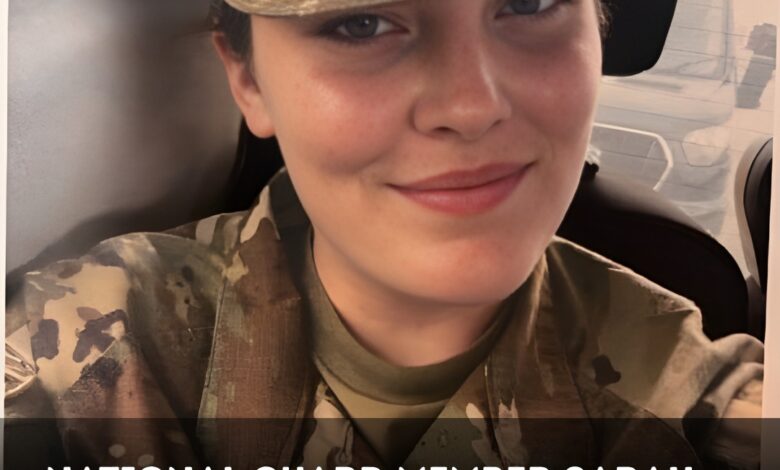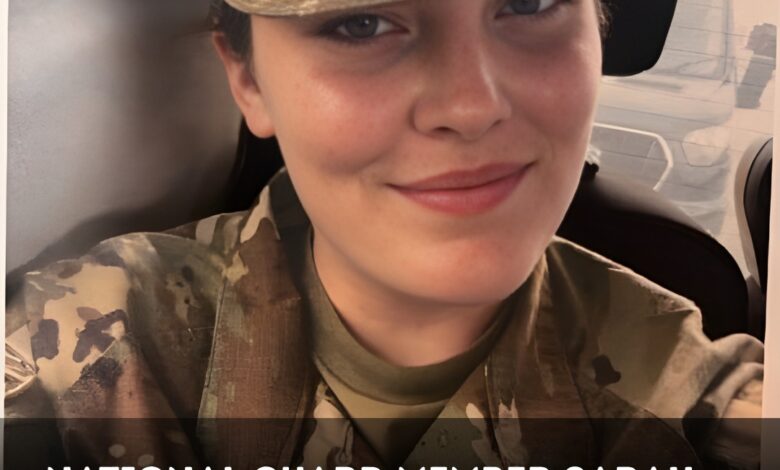
She was barely out of her teens, yet those who served beside her say Sarah Beckstrom carried herself with a steadiness far beyond her years. At twenty, she was one of the youngest members assigned to the National Guard rotation assisting with security near the White House — a post she accepted with pride, even when it meant cold nights, long hours, and pressure that could make seasoned veterans falter. She wasn’t there for recognition or prestige. She was there because she believed in showing up when others hesitated.
People who knew her say that sense of duty showed early. In high school, she was the sort of person who organized food drives without needing a teacher to ask. She volunteered at the community center on weekends, tutored younger kids after class, and spent holidays helping at the town hall dinners in Summersville, carving turkey and passing plates. Uniform or no uniform, she believed service was the point of living. Those who watched her grow up assumed she’d become a nurse, a teacher, or a counselor. When she announced she’d joined the National Guard, no one was surprised — she had simply found another way to serve.
Her deployment to Washington, D.C., felt like the first step in a long career she hoped would carry her into emergency response work. She told her parents it was temporary, “just a security rotation,” and she insisted they not worry. “The safest place in the country,” she joked. “Nothing happens near the White House.”
That belief carried her through long overnight patrols, holiday foot traffic, and tense moments when crowds gathered for protests, parades, and political events. For Sarah, it was all part of the job. And she approached it the same way she approached everything — calm, alert, quietly confident.
That makes what happened all the harder to bear.
The shooting broke out in a matter of seconds, sudden and disorienting, shattering the certainty that this assignment was routine. Witnesses say there was confusion at first, a sound sharp enough to draw attention but too fast to process. Moments later, Sarah was on the ground, her fellow Guardsmen shouting for cover, for medics, for anyone to pick up the radio and confirm what they were seeing.
She was rushed to the hospital, but injuries that deep and that sudden leave little room for hope. Her final hours passed under fluorescent lights and urgent whispers, her father’s voice breaking over the phone as doctors told her family to prepare for the worst. He made it to the hospital in time, but not in time to change the outcome. Nothing could.
Her death became a headline almost instantly — “National Guard Member Killed Near White House.” Politicians issued statements, commentators argued about crime and policy, and social media erupted in familiar shock. But the noise of public reaction only highlighted what gets lost when tragedy becomes content: the people at the center of it.
Behind the briefing rooms and press releases was a family trying to understand how their daughter, who left home with a duffel bag and optimism, would never walk through the door again. Her mother sat on the couch clutching Sarah’s jacket — the one she wore when she left for her shift, the one still holding the faint smell of her perfume. Her younger brother paced the kitchen, replaying the last conversation they had: a quick exchange over text, a promise to visit home soon, a heart emoji she sent without thinking it might be the last one.
Her father, Andrew Wolfe, a former serviceman himself, struggled with a mix of grief and rage. He knew the risks of wearing a uniform. He had lived them. But he also knew Sarah’s station was supposed to be secure, heavily monitored, guarded from the sort of threat that had stolen her life. “She was standing where she believed the country was strongest,” he told a reporter. “If she isn’t safe there, who is?”
The investigation began immediately — ballistic reports, witness statements, surveillance retrieval, interagency coordination. Officials vowed accountability. Press conferences repeated phrases like “swift action” and “ongoing threat assessment.” But for the Beckstrom family, every update felt hollow. No arrest could repair the fracture in their home. No briefing could rewind the moment a single bullet tore through a life not yet fully lived.
Sarah’s squadmates held a memorial the following evening, placing her boots, helmet, and folded flag at the front of the formation. Some of them cried openly, breaking the stoicism expected of soldiers. Others stood stiffly, jaws tight, eyes fixed on the ground. Trauma counselors walked the room quietly, offering space and silence where words failed. Several Guardsmen admitted they were shaken in ways they weren’t prepared to say aloud. One told a friend, “I keep expecting her to walk in late, apologizing for missing the ceremony.”
In Summersville, the church filled to capacity the night of her vigil. Candles lined the steps. Families came with children who barely knew her but understood loss. Her former teachers gathered in a pew together, sharing stories of the girl who stayed after class to clean up markers, the one who always volunteered first, the one who never skipped a chance to help.
What makes her death so difficult for her community is the question no one can answer: why her? Why a young woman who sought nothing but purpose? Why someone who believed in the work, believed in the uniform, believed in the country she served? People keep asking, and the silence in response is its own cruelty.
At the Beckstrom home, the dinner table has one seat that will stay empty. Her mother still sets out a plate sometimes, a habit she can’t break, as if the ritual itself might undo reality. Her father keeps her room exactly as she left it: bed unmade, a half-read paperback on the nightstand, a small collection of photographs taped to the mirror.
This is the aftermath the headlines don’t show — the slow, aching unraveling of a family trying to navigate a world that now feels colder, sharper, and unbearably quiet.
Sarah Beckstrom will be remembered in statements, ceremonies, and official honors. But her truest legacy lives in the people who knew the softness behind her strength, the kindness behind her discipline, and the courage she carried into every space she entered.
Her story now stands as a reminder that behind every uniform is a human being, behind every tragedy is a family, and behind every political debate is a life that cannot be replaced.
And no investigation, no arrest, and no policy change will ever fill the silence left at the Beckstroms’ table.
